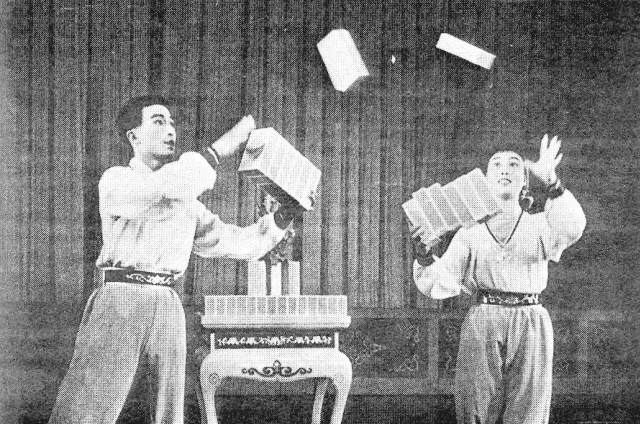|
A graceful diabolo trick.
|

Chinese gymnasts specialize in one prop, such as these boxes. |
Page 9 October 1980
|
A graceful diabolo trick.
|

Chinese gymnasts specialize in one prop, such as these boxes. |
|
On
Sundays and holidays the students go home. Since they live in the city
where they were recruited, it is easy to get home by bus or bicycle. Compensation In
China the pattem is to find a niche, and occupy it comfortably for
life. This is not very different from the pattern elsewhere in Asia,
where there is little emphasis on "doing your own thing",
and career change is almost unheard of. The
acrobats get the same minimum wage that any Chinese worker gets. Until
they are married and leave the dorm they receive free room and board.
Some move out at marriage, but many marry troupe members and continue
to board in apartments for married members. There are special bonuses
for costumes and for special food supplements. Most troupes have their
own doctors, and the acrobats typify the general excellent health of
the Chinese population. The most obvious compensation is the fact that
the acrobats are appreciated by the system that supports them. Skill
development There
is plenty of time. Teachers don't need to push. They demonstrate and
observe. They are respected for their knowledge and capability. What
they say goes. Every step in a complex routine is carefully planned
and discussed. The routine is then learned step by step until it is
perfect. New moves are added to a
routine only after they are perfected. Once a group is together they
will be a team forever, so skill development is a long-range project. Each
person initially specializes in one area or piece of apparatus.
Everyone, however, learns basic juggling, tumbling and balance during
group workouts. A typical troupe may have instructors in balance,
aerial work, object manipulation (diabolo, devil stick, etc.), magic,
spring board, foot juggling and hand juggling. These instructors
generally were with the troupe when it was organized in the early or
mid-1950s, are in their 40s or 50s today, and perform rarely. They may
have trained and now manage three circuses -- a senior troupe formed
in the early '60s, a junior unit formed in the early 70s and a student
troupe formed in the mid-70s, with members down through 9 and
10year-olds.
The
junior and student units are generally quite skilled. They started
younger, and didn't have to deal with the upheavals of the Great Leap
Forward and the Cultural Revolution, which interrupted the careers of
many of the senior troupers. Different
troupes are famous for different skills: Shanghai
for diabolos, Shenyang for devil sticks, Wuhan for spinning plates and
Nanking for juggling clubs and balls. However, some juggling can be
found in every troupe. Each
troupe makes its own juggling props. However, many of the objects
which are manipulated are either common household items or are
adaptations of common objects. The only apparatus manufactured on a
large scale for domestic use and export is the diabolo. For
performance purposes the Chinese manufacture a diabolo which is about
twice as large as the export model. It howls like a banshee when spun. Most
impressive to the Chinese were my IJA Newsletters with pictures of
Western jugglers.
International
exchange Young
jugglers and acrobats from Tanzania, Pakistan, Nepal and several other
countries have gone to China to work with the troupes in major cities,
so there is precedent for whatever we may propose. We now have friends
with the four troupes I visited, and each of them has issued an
invitation on a personal level. Getting
an official invitation and finding funding are the next steps. We must
also decide whether the group will be endorsed by the IJA, and what its
composition should be. It is possible that we will each have to find
individual funding, since inquiry with the U.S. Department of State
indicates that there are no federal funds available for such projects.
Those who are interested in joining the next China trip, please let me
know and I will add your name to the long and growing list. I'll keep
you informed of progress on this, and welcome any ideas on funding. General
impressions I
believe that Mao Tse Tung will be remembered as the greatest man of the
20th century. China has solved the problems of one-fourth of the
population of the world by giving them an adequate diet, housing,
education, medical care, old-age security, employment and pride. There
are almost no rats or flies in China, few mosquitoes and few dogs.
People walk or ride bikes and buses and are much healthier for it.
Thievery is almost nonexistent, as are crimes of violence. Options are
limited for most people, but the system works far better than the one it
replaced.
This
is not to say that I would rather live in China. .
I would miss the freedoms we have here in the U.S. -- travel, association, employment, the freedom to take risks and pursue dreams. But if you enter China without preconceptions it can be a great teacher. If there is enough interest, we can hold a workshop on China at the 1981 Cleveland convention. Hopefully by then we will have more news on an official trip. |